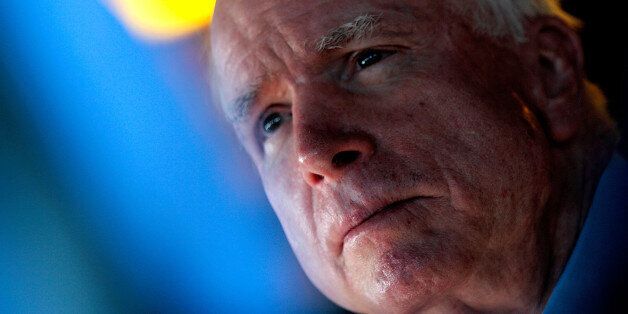Kathleen Miles is the executive editor and cofounder of Noema Magazine. She can be reached on Twitter at @mileskathleen.
SANTA MONICA, Calif. — If Republicans gain the Senate majority in November, President Barack Obama could face pressure from Congress to send ground troops into Iraq and Syria.
“Frankly, I know of no military expert who believes we are going to defeat ISIS with this present strategy,” Sen. John McCain (R-Ariz.) said at a Pacific Council on International Policy conference on Saturday.
“We may be able to ‘contain,’ but to actually defeat ISIS is going to require more boots on the ground, more vigorous strikes, more special forces, further arming the Kurdish peshmerga forces and creating a no-fly zone and buffer zone in Syria,” said McCain, who will, due to seniority, become chairman of the Senate Armed Services Committee in January if the GOP takes the Senate next month.
McCain also said the U.S. needs to remove Syrian President Bashar al-Assad in order to defeat the Islamic State, the militant group also known as ISIS or ISIL.
The Arizona senator has been campaigning in support of GOP candidates for the upper chamber, and has indicated that he is eager to lead the Senate Armed Services Committee, which oversees the country’s military and is considered one of the most powerful committees.
McCain and Republican candidates on the campaign trail are framing Democratic candidates and President Obama as weak on foreign policy and national security. Meanwhile, super PACs like Concerned Veterans for America, which is backed by conservative billionaires Charles and David Koch, are spending millions on new national security-related ads for GOP candidates.
Republicans will need a net gain of only six seats to win a majority in the Senate. Polls suggest they’re on track to do this, while also holding on to the House of Representatives.
It’s no surprise that Republicans are emphasizing foreign policy as a campaign issue. The GOP has an 18-point advantage on which party best deals with foreign policy, according to a recent poll by NBC and The Wall Street Journal. However, a majority of Americans disagree with McCain’s call for ground troops in Iraq and Syria. More than 54 percent of Americans oppose such a move, according to a recent Gallup poll.
And yet, after Obama announced his no-boots-on-the-ground plan in September, numerous Republicans said the president should be open to sending ground troops, or that he should already have done so. Among those critics were House Speaker John Boehner (R-Ohio), Intelligence Committee Chairman Rep. Mike Rogers (R-Mich.), House Majority Leader Kevin McCarthy (R-Calif.), Sen. Lindsey Graham (R-S.C.), Rep. John Fleming (R-La.), Rep. Tom Cole (R-Okla.), Rep. Jack Kingston (R-Ga.), Sen. Jim Inhofe (R-Okla.), Sen. Kelly Ayotte (R-N.H.), Sen. Roger Wicker (R-Miss.) and Sen. Jeff Sessions (R-Ala.).
At a Senate Armed Services Committee meeting in September, Republicans were almost unanimous in calling for a broader war in Iraq and Syria.
Speaking at this weekend’s conference, McCain said that it seemed as though the Islamic State has been driven back, thanks to the fighting spirit of the Kurds as well as U.S. airstrikes. However, he warned that the militant group is adjusting to the airstrikes by dispersing and traveling at night with only one or two vehicles at a time.
In addition to putting American troops on the ground, McCain said the U.S. should more heavily arm the Kurdish forces and the Free Syrian Army, and should create both a no-fly zone and a buffer zone to protect and replenish fighters and refugees. Turkish President Recep Tayyip Erdogan has called on the U.S. to create a no-fly zone where Assad’s air force would be shot down if it entered. McCain said that if the U.S. complied, Turkey would send in its troops to fight the Islamic State.
“It’s immoral to tell [Syrians and Kurds] to fight ISIS but then let them get bombed by Assad,” McCain said. “It’s the most immoral thing since Henry Kissinger abandoned the Kurds many years ago.”
Obama has repeatedly promised that he will not send ground troops to Iraq and Syria. Instead, his strategy has been to help Iraqi and Syrian forces defeat the Islamic State on their own. On Sunday, the U.S. airdropped weapons, ammunition and medical supplies to Kurdish forces defending the Syrian city of Kobani. U.S. Defense Secretary Chuck Hagel and Joint Chiefs Chairman Gen. Martin Dempsey have not ruled out enforcing a no-fly zone over northeastern Syria, and have said they’re open to considering a buffer zone along the Turkish-Syrian border.
McCain said he is “very, very worried about the Iranians, not just because of the nuclear weapons issue but because of their other activities in the region.” He added that he and other Republicans fear that a U.S. deal with Iran will only delay Iran’s progress toward obtaining nuclear weapons, rather than stopping it entirely.
Obama is currently working on an accord with Iran to forestall its ability to make a nuclear weapon in exchange for the U.S. suspending its sanctions against Iran.
McCain said that his first priority is to reverse the defense budget cuts from the 2013 sequestration. He said the U.S. needs to reinstate itself as the world leader of democracy and achieve what former President Ronald Reagan called “peace through strength.”
Constitutionally, the president is commander in chief, and the U.S. cannot go to war without his approval. But congressional pressure matters politically.
When asked how a Republican Congress might work with Obama, McCain said: “We could work with the House and leave the President two choices — either sign or veto. But I’m hoping that if we gain the majority, it will be incumbent on Obama to look at the last two years of his presidency and look at what we can accomplish together.”





